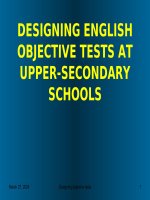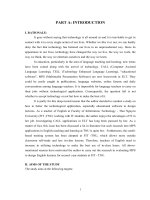- Trang chủ >>
- Lớp 7 >>
- Giáo dục công dân
Thiết kế bài dạy môn Tiếng Anh 11 - Unit 13: Films and Cinema - Period 82 – E – Language focus
Bạn đang xem bản rút gọn của tài liệu. Xem và tải ngay bản đầy đủ của tài liệu tại đây (143.8 KB, 7 trang )
<span class='text_page_counter'>(1)</span>Unit 13: Films and Cinema. Period 82 – E – Language focus I. Objectives 1. Educational aim By the end of the lesson students will be able to: - Distinguish the sounds /f/ and /v/. - Pronounce the words and sentences containing these sounds correctly - Use attitudinal adjectives to describe films or to express their opinion about particular films - Use structure “ It was not until … that … “ and articles “a/an/the” appropriately 2. Knowledge - Pronunciation: /f/ - /v/ - Grammar: structure “It was not until…that…”, the article a/an/the - Vocabulary: Some words about cinema 3. Skills: Four skills especially writing II. Methods Integrated, mainly communicate III. Teaching aids Textbook, pictures… IV. Procedure 1. Organization(1m) 10A…(…/…) 2. Check up: Combine in new lesson 3. New lesson(44m) Stages Teacher’s activities Students’ activities I. - T draw 2 pictures ( a face and a - Close books Pronunciation vase ) on the board ( 7m ) - T points at each of them and asks : - A face / A vase “ what’s this?” - T reads out and asks sts to read - Read after T after several times. - T continues asking sts: “who can show me the sound o the - /f/ and /v/ first letter of these 2 words?” - T introduces: today we will learn how to distinguish 2 sounds /f/ and /v/. Lop11.com.
<span class='text_page_counter'>(2)</span> II. Grammar and Vocabulary 1. Pre-teach newwords(5m). 2. Exercise 1 ( 7m ). - Show the articulation of these sounds and explain to sts: khi phát âm chúng ta chạm răng trên với môi dưới, rồi dùng hơi đưa đi qua khoang miệng, qua răng và môi, rồi dùng giọng của mình để tạo ra 2 âm /f/ & /v/. Chú ý khi phát âm chúng ta để ngón tay ở thanh quản. Khi phát âm /v/ chúng ta sẽ cảm thấy thanh quản hơi rung, còn âm /f/ rung mạnh hơn. *Listen and repeat: - T models once - T asks sts to repeat after - T calls on some sts to read again and corrects if necessary *Practise these sentences - T reads sentence by sentence once and then asks sts to repeat after. - Call on some sts to read again and corrects if necessary. - Look at the articulation of 2 sounds /f/ and /v/, then do according to teacher’s requirement: put the fingers on the voice box.. - T gives some new words: irritate, horrify, frustrate, depress, astronomy, exhaust - Read out these words, explain their meanings and ask sts to read after. - Call on some sts to read out these words. - Practising reading and copy down. - Listen to T - Repeat after T - Read out the words in books - Listen to T - Repeat after T - Read out these sentences in books. - Introduce the exercise: sts are to -Listen to T’s introduction write the adjectival forms of the verbs given. For example: interest => interesting/interested - Read the verbs in the textbook and - Read after ask sts to read after - Ask 2 sts to write down the - Go to the board and write down. Lop11.com.
<span class='text_page_counter'>(3)</span> 3. Exercise 2 ( 7m ). answers on the board - Call on a st to read out the verb roots and other sts to read out some adjectival forms of these verbs. - Check the answers in front of the class , and explain difficult cases, e.g. “fascinate”, “excite”…When adding –ing to the root verbs, sts need to omit “e” - Tell sts that there are two possible adjectival forms for a verb, the –ing form and the –ed form. Give 2 sentences and ask sts to show the difference between them: 1. If this book is interesting , it will interest you 2. Because this book is interesting, you are interested in it -The difference + the –ing form has an active meaning + the –ed form has a passive meaning. the answers - Read out the answers. - Introduce the exercise and ask sts to read all the sentences through. - Get sts to do the 3 first sentences individually in 5 minutes( the 2 last sentences for homework), and go around checking if they work - Call on 3 sts to go to board and write the answers while other 3 sts will read out their answers - Check with the whole class and give the correct answers 1.a) depressing b)depressed 2.a) interested b) interesting 3.a) boring b) bored. - Listen to T’s introduction and read all the sentences through - Do the exercise individually. Lop11.com. - Copy the correct answer if wrong. - Look at 2 examples and give the difference between them Answer: 1. Fascinate=>fascinating/fascinated 2. Excite=>exciting/excited 3. Terrify=>terrifying/terrified 4. Irritate=>irritating/irritated 5. Horrify=>horrifying/horrified 6. Bore=>boring/bored 7. Surprise=>surprising/surprised 8. Amuse=>amusing/amused 9. Embarrass=>embarrassing/embarrasse d 10. Frustrate=>frustrating/frustrated. -Go to the board and write the answers. The rest reads out the answers - Check the anwers with T.
<span class='text_page_counter'>(4)</span> 4. Exercise 3 ( 8m ). 5. Exercise 4 ( 10m ). - Tell sts: we will rewrite the sentences using the structure “ It was not until … that …” in this exercise - Remind sts that in the text of Reading period, we had a sentence using this structure and ask sts to show this sentence and translate it into Vietnamese. - Provide another sentence: It was not until I was 15 that I learned how to ride a bicycle. - Call on a st to translate this sentence into Vietnamese - Ask sts to look at 2 sentences and give the full form of the structure. - Give the full form of the structure: It was not until+(time/clause in past tense)+that+clause in past tense: Cho den( Den tan )… - Get sts to do 3 first sentences individually in 5 minutes ( 2 sentences for homework) - Call on 3 sts to write their answers on the board ( each one writes one sentence). At this time, call on some sts to read out their answers. - Check the answers with the whole class and give the correct answers.. - Tell sts: in this exercise we will revise the indefinite article “a/an” and definite article “the”. Lop11.com. - Show the sentence in the text of Reading period: It was not until 1915 that the cinema really became an industry, and translate into Vietnamese. - Look at T’s example and translate into Vietnamese. - Look at these 2 sentences, think and give the full form of the structure. - Do 3 first sentence individually - Go to the board and write the answers. The rest reads out the answers - Check the correct answers with T. 1. It was not until 1990 that she became a teacher. 2. It was not until he was 30 that he knew how to swim. 3. It was not until 1980 that they began to learn English..
<span class='text_page_counter'>(5)</span> - Ask sts to recall the form, meaning, use of a/an/the, and then show the form, meaning, and use of them in detail. - Divide the class into 2 big groups and each group does 2 sentences - Ask sts to do the exercise individually in 4 minutes. - Call on 2 sts to write down the answers on the board. - Ask some sts to read out the sentences and check the answers on the board with the whole class. - Recall the form, meaning, and use of a/an/the - Do the exercise individually. - Write down the answers on the board. - Some sts read out the answers and the rest checks the correct with T and the whole class. 4. Homework - Finish the rest of exercise 2 and exercise 3 - Practice pronouncing 2 sounds /f/ and /v/ in the part “ Pronunciation”. Lop11.com.
<span class='text_page_counter'>(6)</span> HUNG VUONG UNIVERSITY ------------------------. Teaching plan Student: Nguyen Thanh Ha. Phu Tho, 2010.. Lop11.com.
<span class='text_page_counter'>(7)</span> Lop11.com.
<span class='text_page_counter'>(8)</span>









